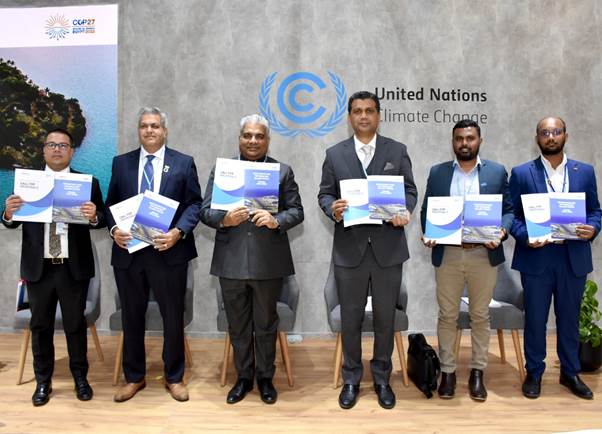Union Minister for Environment Forest and Climate Change participates in a session on “Accelerating Resilient Infrastructure in Small Island Developing States (SIDS)” at COP 27
Highlights:
- Vision of ‘Infrastructure for Resilient Island States’ (IRIS) presented.
- First ‘Call of Proposals’ for the roll out of projects under IRIS announced.
- IRIS enshrines the philosophy of India’s LiFE initiative.
A session on Accelerating Resilient Infrastructure in Small Island Developing States (SIDS) was held at the UNFCCC Pavilion on the side lines of COP 27 today. Union Minister for Environment Forest and Climate Change, Government of India, Shri Bhupender Yadav, Mr. Kavydass Ramano, Minister for Environment, Solid Waste and Climate Change, Government of Mauritius, Senator Matthew Samuda, Ministry of Economic Growth and Job Creation, Government of Jamaica and representatives from AOSIS and Fiji participated in the session.

The agenda of this session was to present the IRIS vision and announce the first ‘Call for Proposals’. The session focused on the IRIS vision 2022-2030 and reflected on the key enabling factors that will facilitate the implementation of the IRIS projects under the first ‘Call for Proposals’. IRIS will be the first initiative that will be rolled out through the Infrastructure Resilience Accelerator Fund (IRAF), launched by the Coalition for Disaster Resilient Infrastructure (CDRI) last week at COP 27.
In his key note address, Shri Bhupender Yadav said:
“It is my pleasure to join you all today to present the vision of ‘Infrastructure for Resilient Island States’ (IRIS) to a global audience and announce the first ‘Call of Proposals’ for the roll out of projects under IRIS.
As you all know, IRIS is a flagship strategic initiative that has been designed as an instrument to achieve and deliver resilience and climate adaptation solutions to the SIDS, which are among the most vulnerable and exposed countries.
Anchored on the key guiding principles of co-creation and complementarity, IRIS was launched at the World Leaders Summit at COP26 by India, UK, Australia, Jamaica, Mauritius and Fiji. It is a joint platform to facilitate cross learning, sharing and engagement on solutions to infrastructure resilience in SIDS.
Ladies and gentlemen, Government of India under the leadership of Prime Minister Shri Narendra Modi stands firmly committed to safeguarding the interests of SIDS in a changing climatic regime.
Today we know that climate change is the most crucial of all other environmental challenges. Without cumulative emissions in check, success with other environmental challenges, even if they are achieved, will not carry lasting value.
India is committed to both domestic action and multilateral cooperation on climate change. We will continue to fight all global environmental concerns in the call to protect humanity’s planetary home. But global warming also warns us that equity and international cooperation, leaving no one behind, hold the key to success, where those most fortunate must lead the way. No nation can undertake this journey alone. Right understanding, right thought and co-operative action – these need to set our path for the next decisive half a century.
Friends,
IPCC’s AR6 Reports tell us clearly that the responsibility for warming is directly proportional to the contribution to cumulative emissions of CO2. All CO2 emissions, whenever they take place, contribute equally to warming.
IPCC Reports and all other best available science also show that India is among those countries with high vulnerability to climate change. So, we are very sympathetic to the situation of the island states and others. India, with over 7500 km of coastline and more than 1000 islands in the surrounding seas, and a large coastal population dependent on the sea for lives and livelihoods, is also a highly vulnerable nation on the global scale. Just to give an example, between 1995 – 2020, India recorded 1058 climatic disaster events.
Considering per capita emissions, for an objective scale for comparison, India’s emissions are, even today, about one-third of the global average. If the entire world were to emit at the same per capita level as India, the best available science tells that there would be no climate crisis.
I am confident that today’s meeting will focus on the long-term vision of implementing IRIS projects. The vision decided here will help in providing an opportunity for SIDS to address their most pressing infrastructure challenges by converging resources and capacities.
Ladies and Gentlemen, through IRIS, India is putting to action its belief in Vasudeva Kutumbakam – the world is one family- and showing its commitment to address climate change with partners to make a better and safer planet for all.
Towards the end, I would like to conclude by quoting Prime Minister Shri Narendra Modi who have effectively conveyed the essence of IRIS. He said and I quote –
“CDRI or IRIS is not just a matter of infrastructure, but it is part of the most sensitive responsibility of human welfare. It is the collective responsibility of all of us towards mankind. It is, in a way, a common atonement for our sins”
About CDRI and IRIS
The Coalition for Disaster Resilient Infrastructure (CDRI) was launched by the Hon’ble Prime Minister in September 2019 at New York. It aims to promote the resilience of new and existing infrastructure systems to climate and disaster risks in support of sustainable development. CDRI promotes rapid development of resilient infrastructure to respond to the Sustainable Development Goals’ imperatives of expanding universal access to basic services, enabling prosperity and decent work
Government of India has supported the Coalition in the creation and operationalization of IRIS since its design phase. Through IRIS, Government of India aims to support SIDS across the globe in making their new and existing infrastructure resilient to disaster and climate risks.
For more information on IRIS click here
****
HS/SSV